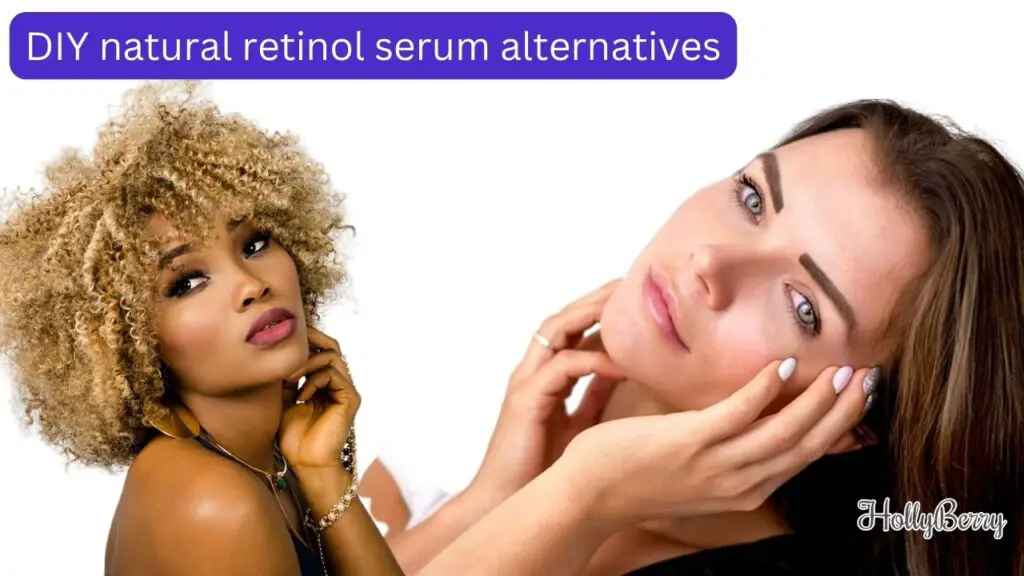Hey there! If you’re someone who is interested in natural skincare, then you might have heard of retinol, a popular ingredient that’s known for its anti-ageing benefits. However, retinol can be harsh on some people’s skin, causing irritation, dryness, and redness.

But don’t worry, because there are natural retinol serum alternatives that you can use to achieve similar benefits without the harsh side effects.
These alternatives are made with natural ingredients, such as plant extracts and oils, and can help improve the texture and appearance of your skin.
In this guide, we’ll explore the world of natural retinol serum alternatives, including their benefits, how to make them at home, and how to use them safely.
So whether you’re looking to switch up your skincare routine or simply curious about natural alternatives, keep reading to learn more!
Benefits of Natural Retinol Serum Alternatives
You’ll be happy to know that there are plenty of benefits to using natural retinol serum alternatives. Retinol is known for its anti-ageing benefits, but it can be too harsh for some skin types.
Thankfully, natural alternatives can provide similar benefits without harsh side effects.
Some benefits of using natural retinol serum alternatives include
Reduction of fine lines and wrinkles
Like retinol, natural alternatives can stimulate collagen production, which helps reduce the appearance of fine lines and wrinkles.
Improvement in skin texture and tone
Natural ingredients like rosehip oil, aloe vera, and vitamin C can help brighten and even out skin tone, while also reducing the appearance of hyperpigmentation and dark spots.
Reduction of acne and breakouts
Some natural retinol alternatives, such as tea tree oil and salicylic acid, have antibacterial and anti-inflammatory properties that can help prevent acne and breakouts.
Moisturization and hydration
Many natural retinol alternatives contain moisturizing ingredients, like hyaluronic acid and glycerin, that can hydrate and nourish your skin, leaving it feeling soft and supple.
Overall, using natural retinol serum alternatives can be a great way to improve the health and appearance of your skin without the harsh side effects of traditional retinol. So why not give them a try and see the benefits for yourself?
DIY Natural Retinol Serum Alternatives
If you’re interested in making your own natural retinol serum alternative, you might be wondering what ingredients to use.
The good news is that there are plenty of natural ingredients that can provide similar benefits to retinol without the harsh side effects.
Some of the most common ingredients used in DIY natural retinol serum alternatives include
Rosehip oil
This oil is rich in vitamins A and C, which can help brighten and even out your skin tone, reduce the appearance of fine lines and wrinkles, and improve the overall texture of your skin.
Aloe vera
Aloe vera is a natural anti-inflammatory and can help soothe and hydrate your skin, making it a great ingredient for those with dry or sensitive skin.
Vitamin C
This powerful antioxidant can help brighten your skin, reduce the appearance of hyperpigmentation and dark spots, and boost collagen production.
Green tea extract
This extract is rich in antioxidants and has anti-inflammatory properties that can help reduce the appearance of fine lines and wrinkles and protect your skin from environmental stressors.
Bakuchiol
This natural alternative to retinol is derived from the babchi plant and has been shown to improve the appearance of fine lines, wrinkles, and skin texture.
There are many other natural ingredients that can be used in DIY natural retinol serum alternatives, so feel free to experiment and find what works best for your skin.
And remember, always do a patch test before applying any new product to your face to ensure that you don’t have an allergic reaction.
How to Make a DIY Natural Retinol Serum
looking to make your own natural retinol serum alternative? we’ve got you covered. Making a DIY serum is simple and can be a fun and rewarding experience. Here’s how to make your own natural retinol serum:
Ingredients
- 1/2 oz rosehip oil
- 1/2 oz jojoba oil
- 1/2 oz evening primrose oil
- 1/2 tsp vitamin C powder
- 5 drops bakuchiol
- 5 drops of lavender essential oil
Instructions
Combine the rosehip oil, jojoba oil, and evening primrose oil in a small glass dropper bottle.
Add the vitamin C powder and shake well to combine. Vitamin C is an unstable ingredient, so it’s important to make small batches of the serum and store it in a cool, dark place to maintain its potency.
Add the bakuchiol and lavender essential oil and shake well to combine. Apply a few drops of the serum to your face and neck after cleansing and toning, and before moisturizing.
That’s it! Your DIY natural retinol serum is ready to use.
Precautions and Side Effects of Natural Retinol Serum Alternatives
While natural retinol serum alternatives are generally considered safe and gentle, it’s important to be aware of potential side effects and take some precautions to ensure that you’re using them safely.
Some common side effects of natural retinol serum alternatives can include:
Mild redness and irritation
Some people may experience mild redness or irritation when first using a new product, especially if they have sensitive skin. If this happens, reduce the frequency of use or discontinue use altogether.
Sun sensitivity
Like retinol, some natural retinol alternatives can increase your skin’s sensitivity to the sun. It’s important to wear sunscreen and limit your sun exposure when using these products.
Allergic reactions: If you have a known allergy to any of the ingredients in a natural retinol serum alternative, avoid using the product or do a patch test first to ensure that you don’t have an allergic reaction.
To use natural retinol serum alternatives safely, here are some precautions you can take
Do a patch test: Before applying a new product to your face, do a patch test on a small area of skin to ensure that you don’t have an allergic reaction.
Use sunscreen: Natural retinol serum alternatives can increase your skin’s sensitivity to the sun, so it’s important to wear sunscreen and limit your sun exposure.
Start slow: If you’re new to using natural retinol serum alternatives, start with a small amount and gradually increase the frequency of use over time to avoid any potential irritation.
Overall, natural retinol serum alternatives are a great option for those looking for a gentle, natural skincare product.
My conclusion and Final Thoughts on Natural Retinol Serum Alternatives
I hope that you found this guide to natural retinol serum alternatives helpful and informative. In conclusion, natural retinol serum alternatives can be a great option for those who want to improve their skin’s health and appearance without the harsh side effects of traditional retinol.
With ingredients like rosehip oil, aloe vera, and vitamin C, natural retinol serum alternatives can provide similar benefits to retinol, including reducing the appearance of fine lines and wrinkles, improving skin texture and tone, and reducing acne and breakouts.
When making your own DIY natural retinol serum, be sure to follow the instructions carefully and do a patch test before applying it to your face. Always be aware of potential side effects, like mild redness and irritation, sun sensitivity, and allergic reactions.
Overall, natural retinol serum alternatives can be a great addition to your skincare routine. They’re gentle, effective, and made with natural ingredients that are good for your skin.
So why not give them a try and see the benefits for yourself? We hope that you found this guide helpful and wish you all the best on your natural skincare journey!


